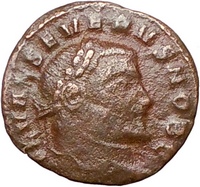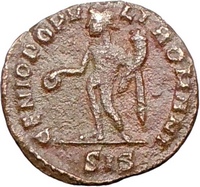Severus
II Roman Emperor 306-307 A.D. Biography as Read By World-Renowned
Numismatic Coin Dealer and Best Place to Buy Ancient Coins
Buy Coins of Severus II Roman Emperor
Severus was of humble birth, born in the Illyrian provinces around the
middle of the third century AD. He rose to become a senior officer in
the Roman army, and as an old friend of Galerius, that emperor ordered
that Severus be appointed Caesar of the Western Roman Empire, a post
that he succeeded to on 1 May 305. He thus served as deputy-emperor to
Constantius I (Constantius Chlorus), Augustus of the western half of
empire.
 
Example of Authentic Ancient
Coin of:
Severus II - Roman Emperor : 306-307 A.D.
Bronze Quarter Follis Siscia mint: 305-306 A.D.
Reference: RIC 170a
FLVALSEVERVSNOBC - Laureate head right.
GENIOPOPVLIROMANI Exe: SIS - Genius standing left, holding patera and
cornucopia.
* Numismatic Note: Very rare, possibly unpublished
type with no legend matching this one in several online databases.
The Genius is the 'power' which is inherent in man, not only
becoming manifest in his virility but signifying extensively his whole
personality. The Genius is neither 'soul' nor 'life'. It's particular to
each one and ceased with his death. It is a kind of active principle
which could be found too in collectives like troop units, councils and
so on. It is assigned too to localities like provinces or cities. Power
and prestige of the pater familias explain that the domestics worshipped
his Genius and swore by him. The oath by the Genius of the emperor
became common in private and public fields. False oath was a crime
against the emperor. The concept of the Genius Augusti was the
possibility to assign divine attributes to the emperor without making
him a god directly which was frowned especially in the western part of
the Empire!
The need for protection resulted in the idea of the Genius as protection
spirit, but it was never clear whether he was immanent to men or has his
own existence. In later times these ideas were mixed with the conception
of the soul which could be found in grave inscriptions. The conception
of the Genius as sum of the personality expanded to the idea of the
Genius of a god: Genius Iovi. This required the conception of a full
personalized deity.
Meaningful is the Genius Populi Romani which is not only the Roman
interpretation of the Greek City deity Tyche. On October 9 the festival
of the Genius Publicus was celebrated. The later snake shape was an
amalgamation with the well-known incarnation and soul conception. The
Genius indeed was linked to a person but not identical with him. Life
arises 'by appearing of the Genius', who then obtained it continually.
We can see that the ancient world had difficulties with the
interpretation of the Genius. But worshipping of the Genius was alive
until the beginning of Christianity.
Flavius Valerius Severus (or rarely Severus
II) (died February 307) was a
Western Roman Emperor from 306 to 307
(1 May 305 summer 306 (as
Caesar in the west under
Constantius Chlorus);
summer 306 March or April 307 (as
Augustus in the west, in competition
with
Constantine,
Maxentius, and
Maximian).
Severus was of humble birth, born in the
Illyrian provinces around the middle of
the third century AD. He rose to become a senior officer in the Roman
army, and as an old friend of
Galerius, that emperor ordered that
Severus be appointed
Caesar of the
Western Roman Empire, a post that he
succeeded to on 1 May 305. He thus served as deputy-emperor to
Constantius I (Constantius
Chlorus),
Augustus of the western half of
empire.
On the death of Constantius I in the summer of 306,
Severus was promoted to Augustus by
Galerius himself, in opposition to the
acclamation of
Constantine I (Constantius' son) by his
own soldiers. When
Maxentius, the son of the retired
emperor
Maximian, revolted at
Rome, Galerius sent Severus to suppress
the rebellion. Severus moved from his capital,
Mediolanum, towards Rome, at the head
of an army previously commanded by Maximian. Fearing the arrival of
Severus, Maxentius offered Maximian the co-rule of the empire. Maximian
accepted, and when Severus arrived under the walls of Rome and besieged
it, his men deserted him and passed to Maximian, their old commander.
Severus fled to
Ravenna, an impregnable position:
Maximian offered to spare his life and treat him humanely if the latter
surrendered peaceably, which he did in March or April 307. Despite
Maximian's assurance, Severus was nonetheless displayed as a captive and
later imprisoned at
Tres Tabernae. When Galerius himself
invaded Italy to suppress Maxentius and Maximian, the former ordered
Severus's death: he was executed (or forced to commit suicide) on 16
February 307.
|